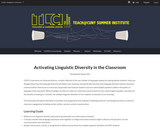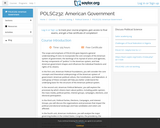
- Subject:
- Education
- History
- World History
- Material Type:
- Homework/Assignment
- Provider:
- CUNY Academic Works
- Provider Set:
- Hostos Community College
- Author:
- Lundberg, Karin
- Date Added:
- 01/01/2020















This assignment is designed for students in First Year Seminar for Engineering and Computer Science. The main goal of the assignment is to introduce students to their major and stimulating their interests related to career choices and academics. This will give students a chance to develop integrative learning skills by making connections between their major and respective career opportunities. This assignment will use new features of ePortfolio to enhance student‰Ûªs creativity by customizing everything from background, photos, fonts, text, portfolio content etc. Instead of a uniform profile, each students‰Ûª page will reflect the distinct visual representation of their personality, brand, major, and career. Students will review their peers‰Ûª ePortfolios to provide constructive feedback. The ePortfolio page will later be deposited once approved by the faculty.

CUNY’s classrooms are famously diverse, a reality reflected in the vast number of languages spoken by undergraduate students. Have you thought about how this language diversity will impact your teaching, and specifically how they how language dynamics impact classroom communication? How do we as instructors (especially international students and non-native English speakers) address the politics of language in the classroom? What strategies are there to make our classrooms more inclusive of non-native English speakers, and what are the benefits of seeking to “activate” the multiple linguistic identities of our students as elements of our learning?
This workshop will expose attendees to activities and assignments that empower multilingual learners and foreground diverse modes of classroom engagement including verbal, written, and non-verbal communication.

This project will be a culmination of work that the student will do over the course of the semester. The first step is for the student to identify a country that they wish to examine. By the end of the semester, the student will be able describe, in a 5 – 8 page paper, the experience/heritage of Africans and African identity in that country. Alternatives to a paper submission are also accepted with consultation and approval from the instructor.
![Air Pollution [Liberal Arts: Math and Science/Natural Science]](https://opened.cuny.edu/static/newdesign/images/materials/default-thumbnail-index.png)
This assignment was designed for students in the pathways introductory chemistry class and the first year seminar and aligns with the Inquiry and Problem Solving core competency. In this context, there is a focus on framing the issues (identifies and/or addresses questions and problems), evidence gathering (assembles, reviews and synthesizes evidence from several diverse sources), evidence (analyze the data to address the questions posed) and conclusions (critical thinking, reflect on the outcomes, draw conclusions and generate new knowledge). There is also a Global Learning component based on comparing data collected locally with corresponding data from other locations or countries. The assignment includes the written communication ability with a focus on "Content Development and Organization," as well as the clarity of the communication and its purpose. The overall aim of this assignment is to enhance students' conceptual learning and understanding of key issues related to society as well as their course. This assignment was developed as part of a LaGuardia Global Learning mini-grant and CUNY Experiential Learning and Research in the Classroom mini-grants.
The assignment will be scaffolded over about 3 weeks and is worth about 10% of the final grade.
To further increase the success of this assignment, instructors might want to consider the following: Use class discussions to focus on the relevance and importance of conceptual learning. In order to improve the data analysis aspect, incorporating class demonstrations of how to conduct the analysis and guide discussions about what the data means. Giving students more detailed rubrics with formal expectations of the requirements of the assignments, particularly in the written format Find ways to increase student participation in class discussions.
When this assignment has been utilized in previous semesters, students clearly displayed the capability to relate the co-curricular experiences in the data collection and its analysis to concepts and ideas covered during class. Evidence for this came from very dynamic and interactive class discussions based on air pollution as well as from the output of the written assignment, in which students were able to relate the nature, sources and chemical properties of the pollutants to their impact on the environment, health and society in general.
LaGuardia's Core Competencies and Communication Abilities
List the Program Goal(s) that this assignment targets
Global Learning based on comparing pollutant levels around the LaGuardia campus with those in other locations or countries. It is also an IPS assignment, incorporating scientific literacy and thinking, as students need to analyze the data, interpret it and reflect on the outcomes.
List the Student Learning Objective(s) that this assignment targets
Identify and apply fundamental chemical concepts and methods. Gather, analyze, and interpret data.
List the Course Objectives(s) that this assignment targets
Explore the complex connections between chemistry and society. Apply chemical principles to real world issues, including ethical aspects. Gather, analyze, and interpret data.
Write a short description of the pedagogy involved in executing this assignment
Students collect and analyze the data, interpret the results in terms of pollution levels, safety and ethics and compare with EPA standard levels and with levels in other countries.
Outside the classroom events will be organized for data collection. There will be class and group-based discussions focused on the data, its analysis and the connections to society.

Introductory course on American Government, designed also to prepare for the College Board's CLEP subject matter exam.

This assignment works toward developing students' competency in Inquiry and Problem Solving. The problem solving arises as they negotiate contradictory viewpoints about genres of American music, specifically related to topic areas covered in class (such as class, gender, identity, race, authenticity, and place).